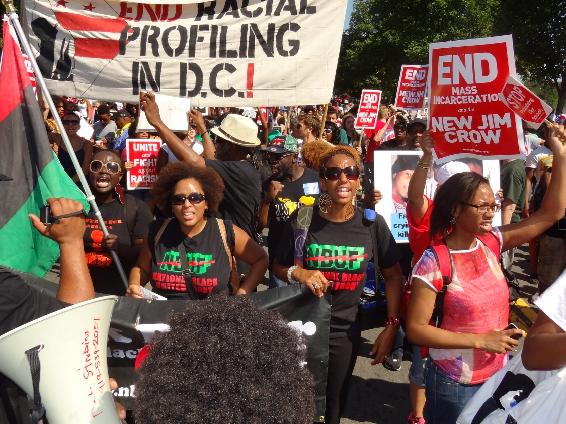1.4: Change and Tension, Minorities Struggle for Power
- Page ID
- 16087
In the United States changing and adding cultural and ethnic multiplicity, the police are most likely to be aligned with the old cultural and ethnic guard, or they may be perceived as such by new, or newly empowered, constituents. As a result, questions about the philosophy and practice of policing are ultimately liable to come under close and probing scrutiny.
The police operate at “street level,” where they have direct contact with all who are involved in any way with law and public safety. In fact, the police represent the sole agency with which the vast majority of those who ever have any dealings with the criminal justice system come into contact. As a result, the police have enormous power to influence attitudes and public opinion about fundamental concerns regarding a political entity’s capacity to act in just, legitimate, and accountable ways. Police-community relations are shaped on the street and in the station houses, and it is there that such controversial practices as profiling and “zero tolerance” are enacted. Using their discretionary arrest powers, the police are also the gatekeepers of the criminal justice process. They determine who is subjected to the power of the law and who is not. Because of this unique role and powerful position in society, the police are likely both to influence and to be influenced by the social implications of migration and shifts in the political power of various communities.

Rapid transformations in the relative heterogeneity of the population, and the accompanying discourse on multiculturalism, can lead to questions about the validity of definitions of laws or crimes for some groups and conceptions of “order” or “disorder” for others. Conversely, the arrival of new groups often provokes questions about the appropriateness of practicing what those groups consider “normal” domestic or familial relations, duties, or privileges. Thus, an increase in the number of ethnic, cultural, and linguistic communities and racial groups can give rise to conflicts about the legitimacy of legal and communal standards and definitions, and hence present an enormous challenge to law enforcement and order maintenance activities.
The emerging new paradigm of policing multi-ethnic societies based on responses of the American police to today’s mix of ethnic diversity. That record provides much to be hopeful about, but some cautions must be noted, and much remains to be done. The portrait is at odds with one that might be imagined from reading the newspaper headlines, watching cable news, or reading twitter. Although appalling racial incidents continue to occur, to focus on them is to miss the profound changes that are taking place.
For those who believe that the complexity of the problems of policing multi-ethnic societies can be resolved by something as simple as adopting principles of community policing or by having the police agency staffed and controlled by members of a formerly marginalized minority are mistaken. In the end racially and ethnically sensitive policing depends upon good judgment by political leaders, police executives, and street officers, however good judgment is not guaranteed by either race or police strategy.

